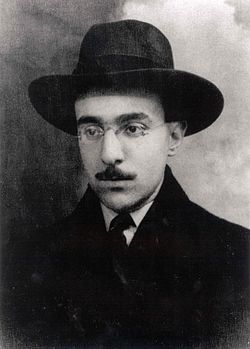Fernando Pessoa Quote
Tomorrow I too - this feeling and thinking soul, the universe I am to myself - yes, tomorrow I too will be someone who no longer walks the streets, someone others will evoke with a vague: 'I wonder what's become of him?' And everything I do, everything I feel, everything I experience, will be just one less passer-by on the daily streets of some city or other.
Fernando Pessoa
Tomorrow I too - this feeling and thinking soul, the universe I am to myself - yes, tomorrow I too will be someone who no longer walks the streets, someone others will evoke with a vague: 'I wonder what's become of him?' And everything I do, everything I feel, everything I experience, will be just one less passer-by on the daily streets of some city or other.
Related Quotes
Certainly we can say that the pace of modern life, increased and supported by our technology in general and our personal electronics in particular, has resulted in a short attention span and an addict...
Arthur Rosenfeld
Tags:
being, complicated, critical thinking, daoism, emotion, feeling, hectic, life, meditation, modern life
About Fernando Pessoa
Fernando António Nogueira de Seabra Pessoa (; Portuguese: [fɨɾˈnɐ̃du pɨˈsoɐ]; 13 June 1888 – 30 November 1935) was a Portuguese poet, writer, literary critic, translator, and publisher. He has been described as one of the most significant literary figures of the 20th century and one of the greatest poets in the Portuguese language. He also wrote in and translated from English and French.
Pessoa was a prolific writer both in his own name and approximately seventy-five other names, of which three stand out: Alberto Caeiro, Álvaro de Campos, and Ricardo Reis. He did not define these as pseudonyms because he felt that this did not capture their true independent intellectual life and instead called them heteronyms, a term he invented. These imaginary figures sometimes held unpopular or extreme views.
Pessoa was a prolific writer both in his own name and approximately seventy-five other names, of which three stand out: Alberto Caeiro, Álvaro de Campos, and Ricardo Reis. He did not define these as pseudonyms because he felt that this did not capture their true independent intellectual life and instead called them heteronyms, a term he invented. These imaginary figures sometimes held unpopular or extreme views.
